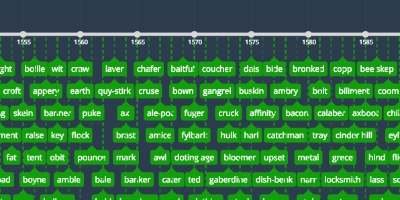jan 1, 1564 - messuage
Description:
Originally, the ‘messuage’ was a piece of land occupied, or intended to be occupied, as a site for a dwelling-house. Over the centuries the word then acquired new layers of meaning which reflected the individual histories of such properties. Chaucer used it, and it is recorded as early as 1290 in an official document, after which it was employed regularly in title deeds. It may appear to be simply a synonym for dwelling house, but the messuage included outbuildings such as barns and cow-houses, and also any neighbouring lands that were traditionally associated with the dwelling. These were probably distinct from the ‘appurtenances’ of the messuage. In 1587 John Kaye’s share of a divided property was described as <i> the dwellinge howse, beynge the est end of the messuage </i>(YDK78). </br> Occasionally, such a messuage is described in detail, and the breadth of the meaning then becomes clear. For example, there is a document of 1564 entitled <i> A territorie or bondarie of one mesuage callid Moysey Hill </i>, a dwelling in the hamlet of Rowley near Huddersfield, and the survey consists of no fewer than twenty-six short paragraphs, in which the names of the enclosures and land that were deemed to be part of the messuage are given. They include <i> Knolgreave Close … Brodeynge … Swynes Croft … Tomrode … Armyteige … Ellys Acre </i>and<i> Gaverholme </i>, and <i> airable land at the north ende of the lane goynge to the Cowmes </i> (YDK57-8). The place-name Moysey Hill has not survived, but many of the fields can be identified on later maps and they allow us to locate its former site with some accuracy. ‘Messuage stead’ marked the site of a messuage, and can be compared with mese stead above: 1517 <i> two messuagez steddes and a tofte </i>, Threshfield (YRS140/62); 1546 <i> Lyonell Rolston, ij messuage steids with one kilnehouse, ijs iiijd, </i> Pontefract (SS92/277): in the same survey is a reminder of the word’s earliest meaning: 1546 <i> one mesuage stede not buylded upon, </i>Water Fryston (SS92/334).Added to timeline:
Date:
jan 1, 1564
Now
~ 461 years ago
